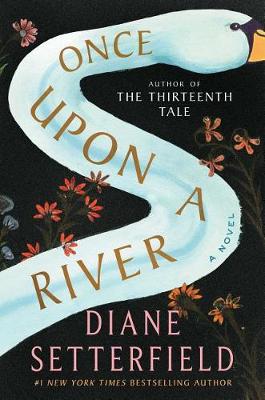
justine_manzano
Written on Jan 29, 2021
So when I committed myself to the 2021 PopSugar Reading Challenge, I reveled in the idea that I would get to bust through books in my TBR I hadn’t had a chance to read yet. My first selection was Once Upon a River by Diane Setterfield. It’s a historical fiction/magical realism book, and it’s not something I would normally select for myself. So I went in skeptical.
Book Summary:
On a dark midwinter’s night in an ancient inn on the river Thames, an extraordinary event takes place. The regulars are telling stories to while away the dark hours, when the door bursts open on a grievously wounded stranger. In his arms is the lifeless body of a small child. Hours later, the girl stirs, takes a breath and returns to life. Is it a miracle? Is it magic? Or can science provide an explanation? These questions have many answers, some of them quite dark indeed.
Those who dwell on the river bank apply all their ingenuity to solving the puzzle of the girl who died and lived again, yet as the days pass, the mystery only deepens. The child herself is mute and unable to answer the essential questions: Who is she? Where did she come from? And to whom does she belong? But answers proliferate nonetheless.
Three families are keen to claim her. A wealthy young mother knows the girl is her kidnapped daughter, missing for two years. A farming family reeling from the discovery of their son’s secret liaison, stand ready to welcome their granddaughter. The parson’s housekeeper, humble and isolated, sees in the child the image of her younger sister. But the return of a lost child is not without complications and no matter how heartbreaking the past losses, no matter how precious the child herself, this girl cannot be everyone’s. Each family has mysteries of its own, and many secrets must be revealed before the girl’s identity can be known.
What I Enjoyed:
I wasn’t sure how I’d feel about this book, but I really enjoyed it. There were some really strong characters here, and the mystery in this story kind of drove me nuts. I couldn’t figure it out. The three families who believed the girl was theirs gave me different reactions. Vaughans were immediate sources of sympathy, given they were mourning the disappearance of their daughter, a parent’s worst nightmare. Robert Armstrong won my heart, a gentle man, often feared because he was a black man, (bullshit, but that’s reality, and it’s never seen as a reasonable reaction to him), who loves animals and his fellow man alike, and will go to great lengths for them, even when it isn’t appreciated or reciprocated. Lily White is a simple woman, but there’s something questionable about her from the start, and you just know there’s more to her. But the thing is, there’s more to everybody, and that’s the beauty of this piece.
And aside from the characters listed in the description, we are treated to a host of other wonderful characters. There’s the storytelling owners of The Swan, the tavern at the center of the story, where the child is first brought, and from which the story of the girl spreads. There’s Daunt, the photographer who rescues the child from the river and suffers some injuries along the way. When he recovers, he sets himself on a mission to capture the wildness on the river on film, while simultaneously devoting himself to helping Rita, the nurse who helped him, solve the mystery of the child. Because the girl came into The Swan dead, and somehow revived while she was there. And Rita only believes in one thing–science. This is not science. This has to be something else.
What I’d Avoid:
It feels incorrect to even say what I believe I’d avoid in writing, because I believe it’s a product of not being accustomed to the genre. But even so, just going based on my opinion when I read it, I felt like the story was a little slow getting started. Again, this definitely felt like a genre-related issue more than anything. It’s my understanding that historical stories tend to rev up a little slower, and I feel I’ve grown very used to reading YA novels, due to my career being focused in that area. This is an adult novel, and I might be a little unaccustomed to the build-up time required in an adult novel. Either way, this slowness wasn’t terribly detrimental to the plot, and though it took me a few days to get into it, once I was in I was swept away.
What I Can Learn From It:
Aside from the characters, which I mentioned above, there’s also the mystery and the fantasy elements. Not only was the girl the mystery, but there are several mysteries behind each of these families that entwine together in unexpected ways. There is, underneath it all, an undercurrent of magic, that makes everything suspect, just as surprising sometimes as the strength of the very river at the root of this story. This balance was done so well, that it was often surprising, but never completely unbelievable.
In a world about families living along the River Thames, it’s still unsurprising to learn about Quietly, the river’s version of the grim reaper. Or that one town that had possibly been destroyed by dragons. Nor is it surprising to learn about the prescient pig.
This all plays into something else I, as an author, could stand to learn from this story. This was something of a fairy tale. With The Swan being established as a place for storytellers, the language and the method of storytelling all takes on this, almost dreamy tone. This kind of mastery of language was a fun thing to witness, and I ate up that knowledge ravenously. Every now and then, I learn some new fun writing exercise, some fun new aspect to perfect, and that’s why I love to read outside my genre.
Would I Recommend It:
Absolutely. If this is your gateway into historical fiction or magical realism, it’s a great one. Many of the characters will have you rooting for them, and the secret of the girl pays off in many satisfying ways, as do the family mysteries and subplots. While not something I could call a fun ride, as it’s a bit solemn, this story was an immersion experience. I felt like I was part of the English riverside, and I didn’t really want to leave. . .until I was shooed away by the narrator (this actually happens.)


